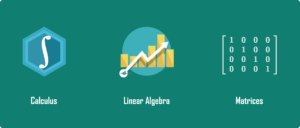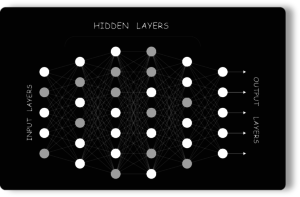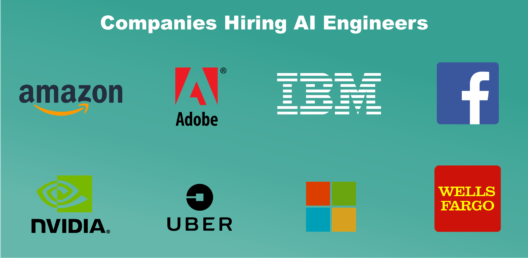Artificial Intelligence Certification Course
- 19k Enrolled Learners
- Weekend
- Live Class
It is no secret that Artificial Intelligence or AI is an emerging technological trend. According to a Gartner Report, Artificial Intelligence is going to create 2.3 million Jobs by 2024, replacing the 1.8 million it will eliminate. The Job Growth has already flooded the industry, as the demand for someone with AI skills has already doubled over the past few years. So, in this article, I’ll guide you through the path on How to Become an Artificial Intelligence Engineer in the following order:
AI is a technique that enables machines to mimic human behavior. Artificial Intelligence is the theory and development of computer systems able to perform tasks normally requiring human intelligence, such as visual perception, speech recognition, decision-making and translation between languages.
If you ask me, AI is the simulation of human intelligence done by machines programmed by us. The machines need to learn how to reason and do some self-correction as needed along the way.
An artificial intelligence engineer works with algorithms, neural networks, and other tools to advance the field of artificial intelligence in some way. These professionals may work on various types of artificial intelligence in different industries, for example

An Artificial Intelligence engineer is someone who works on artificial intelligence problems or technologies. Engineers may also choose between projects involving weak or strong artificial intelligence, where different setups focus on different capabilities. That’s a topic for another discussion. Now there are many ways one could reach there. So, let’s see how to become an Artificial Intelligence Engineer.
1. Now, if we start from the Basics, one needs to earn a Bachelor’s Degree first. It can be from either of the following areas or Subjects:
2. The next step is to fine-tune your Technical Skills. An important thing to note here is that in order to become an AI Engineer one not only needs to be good at programming but also good at Software Development techniques and practices. They need to be knowledgeable both theoretically and practically about the following topics:
3. Apart from technical Skills there are also must have Business Skills one must possess while planning on How to Become a Successful Artificial Intelligence Engineer. Some of these skills include:
4. Now, these skills can either be achieved through practice or by opting for a Master’s Degree. As AI is a newly emerging topic in today’s world, a lot of recent discoveries and research is going on which can be useful for your thesis. Going for a Master’s Degree in Data Science, Machine Learning or Computer Science is advised.
Another Option is to go for Industry Certifications for Machine Learning, Deep Learning or Data Science. This will add a lot of value to your resume and will help you get in-depth knowledge of topics both theoretically and practically. Which will, in turn, help you get an edge over other competitors.
This 𝐂𝐡𝐚𝐭𝐆𝐏𝐓 𝐓𝐮𝐭𝐨𝐫𝐢𝐚𝐥 is intended as a Crash Course on 𝐂𝐡𝐚𝐭𝐆𝐏𝐓 for Beginners. 𝐂𝐡𝐚𝐭𝐆𝐏𝐓 has been growing in popularity exponentially. But, 𝐂𝐡𝐚𝐭𝐆𝐏𝐓 is still not known to many people. In this video, I aim to show you the different ways in which you can use 𝐂𝐡𝐚𝐭𝐆𝐏𝐓 for yourself. 𝐂𝐡𝐚𝐭𝐆𝐏𝐓 has been the buzzword for a while now. This yap lab was put on the throne 5 days after its release and has been changing the game ever since.
Immerse yourself in the fascinating world of Generative AI with our Introduction to Generative AI. This course will equip you with the skills and knowledge to create unique and creative content, from music and art to text and images. Explore the vast possibilities of Generative AI and learn how to unleash your creativity by enrolling now. Don’t miss out on this incredible opportunity to become a master of Generative AI!
In the roadmap of How to Become an Artificial Intelligence Engineer, we saw some Technical and Business Skills required. Let’s have a closer look at those skills. Starting with Technical Skills:
One needs to be good at programming languages and not only that it’s important to have a solid understanding of classes and data structures.

Sometimes Python won’t be enough. Often you’ll encounter projects that need to leverage hardware for speed improvements. Make sure you’re familiar with basic algorithms, as well as classes, memory management, and linking.
You’ll need to be intimately familiar with matrices, vectors, and matrix multiplication. If you have an understanding of derivatives and integrals, you should be in the clear. Statistics is going to come up a lot.

At least make sure you’re familiar with Gaussian distributions, means, and standard deviations. You need to have a firm understanding of Probability to understand models like
ML makes computers learn the data and making own decisions and using in multiple industries. It resolves the complex problem very easily and makes well-planned management. Our MLOps certification provides certain skills to streamline this process, ensuring scalable and robust machine learning operations.
Having a firm understanding of algorithm theory and knowing how the algorithm works are very important. You will need to understand subjects such as Gradient Descent, Convex Optimization, Lagrange, Quadratic Programming, Partial Differential equation, and Summations.

All this math might seem intimidating at first if you’ve been away from it for a while. Yes, Machine Learning and Artificial Intelligence is much more math-intensive than something like front-end development.
Natural Language Processing combines two of the major areas of work ie. Linguistics and Computer Science and chances are at some point you’re going to work with either text or audio or video.

So it’s necessary to have good control over libraries like Gensim, NLTK, and techniques like word2vec, Sentimental Analysis, and Summarization.

We need Machine Learning for tasks that are too complex for humans to code directly, i.e. tasks that are so complex that it is impractical. Neural networks have been by far the most accurate way of approaching many problems, like Translation, Speech Recognition, and Image Classification, which plays a very important role in the AI department.
Apart from these Technical Skills, there are certain Non-Technical skills or Business Skills that are also reqiired to become one Successful AI Engineer. So, let’s continue this How to Become an Artificial Intelligence Engineer article to understand what exactly do I mean by Non-Technical Skills.

You’ll need to explain ML and AI concepts to people with little to no expertise in the field. You might also need to learn from electrical and robotics people. Communication is going to make all of this much easier.
AI Engineers must look at the numbers, trends, and data and come to new conclusions based on the findings. Questioning established business practices and brainstorming new approaches to AI.

Whether you look at the rise of AI will excitement or trepidation, the robots are here to stay in one form or another. Combining this new technology with the strongest traits of the uniquely human mind offers a world of potential that has yet to be fully explored.

Iterating on ideas as quickly as possible is mandatory for finding one that works. In machine learning, this applies to everything from picking the right model, to working on projects such as A/B testing. You need to do a group of techniques used to quickly fabricate a scale model of a physical part or assembly using three-dimensional computer-aided design, especially while working with 3D models.
The most successful Artificial Intelligence projects out there are going to be those that address real pain points. Whichever industry you’re working for. You should know how that industry works and what will be beneficial for the business.

If an Artificial Intelligence Engineer does not have business acumen and the know-how of the elements that make up a successful business model, all those technical skills cannot be channeled productively.
Now, with these Skills, one can surely land a Job as an Artificial Intelligence Engineer, but once you are working you need to also know what exactly you’ll be doing in the day to day life. So here are the key Roles and Responsibilities of an AI Engineer.

Depending upon their Level of Expertise AI Engineers in general:
According to Indeed the Average Salary of an Artificial Intelligence Engineer is around $110,000 per Annum, with a minimum of $105,244 and a maximum of $144,611. Let’s move to our final section of “How to Become an Artificial Intelligence Engineer” and see which companies are Hiring these Professionals.
Companies that hire top AI talent range from startups like Argo AI to tech giants like IBM. According to Glassdoor, these are the leading employers who hired top AI talent over the past year.

So, with this, we come to an end of this article. I hope you got an idea about Artificial Intelligence Engineer profile and what is the correct path one needs and the skill sets required that make this job a unique one of it’s kind. Now that you know how to become an Artificial Intelligence Engineer, you must check out Edureka’s Machine Learning Course.
Also, Elevate your skills and unlock the future of technology with our Prompt Engineering Certification! Dive into the world of creativity, innovation, and intelligence. Harness the power of algorithms to generate unique solutions. Don’t miss out on this opportunity to shape the future – enroll now and become a trailblazer in Generative AI. Your journey to cutting-edge proficiency begins here!
If you have any queries related to this article please leave them in the comments section below and we will revert as soon as possible.
 Thank you for registering Join Edureka Meetup community for 100+ Free Webinars each month JOIN MEETUP GROUP
Thank you for registering Join Edureka Meetup community for 100+ Free Webinars each month JOIN MEETUP GROUPedureka.co
Hello, I am Saurav and I am a regular visitor of your blog this blog is actually very helpful for student because in the present-day artificial intelligence is the main subject and I think in the future maximum thing can depend on artificial intelligence technology and nowaday every engineering colleges are adding this subject in the course and I am studying in IIMT Group of college greater Noida and here our college provides this course you can visit artificial intellogence Course.